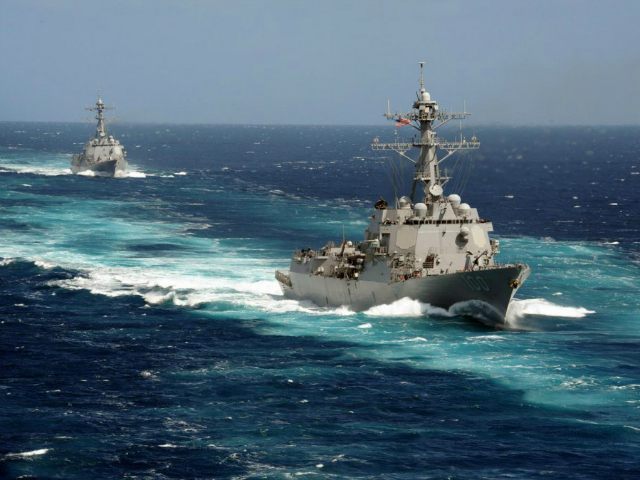The U.S. Navy 6th Fleet, based in Italy, is ramping up to confront aggressive Russian airplanes and warships in waters around Europe and an expanding Islamic State (ISIS/ISIL) in North Africa, reports the Navy Times.
Charged with directing the operations of ships, submarines, and aircraft in Europe and swathes of Africa, 6th Fleet commanders are reportedly “raising alarms” in response to the threats they are facing.
“When you look at the security situation writ-large, at all the threats, there are significantly more as we exit 2015 and roll into 2016 at all points of the compass,” Vice Adm. James Foggo, head of the 6th Fleet, told Navy Times.
“The situation confronting the Naples, Italy-based 6th Fleet isn’t pretty. Russian airplanes and warships are aggressively confronting U.S. and NATO forces after swallowing up a huge swath of eastern Ukraine a year ago,” points out the Times. “And Islamic State militants are spreading chaos into more regions of North Africa.”
The U.S. destroyer Carney arrived in Rota, Spain, in September to join the Ross, Donald Cook, and Porter as forward deployed ships based there.
“All four destroyers are armed with state-of-the-art missile defense systems and are the sea arm of the Obama administration’s European ballistic missile shield; an Aegis Ashore installation is set to come online later this year in Deveselu, Romania,” explains Navy Times.
With the addition of the four destroyers in Europe, the size of the 6th Fleet surface fleet has reportedly “quintupled” in size.
“It’s a fantastic capability because we can keep two of those guys comfortably out to sea at any one time,” Foggo said of the new destroyers. “I can send one up north, I can send one to the Eastern Med — I can be in hotspots in a matter of hours, not days, because we are in the theater.”
Prior to the deployment of the four destroyers, the 6th Fleet only commanded the ship Mount Whitney, homeported in Naples, Italy, with ships on deployment in the region also reporting to the 6th Fleet.
Waters around Europe, which were considered for many years as an R&R stop for sailors on the way to the Middle East, are reportedly more contested than they used to be.
Now, sailors must be ready for anything when they deploy to the region, declared Foggo.
“So when a sailor gets underway, we may have a set mission: say, intelligence preparation of the environment in the eastern Mediterranean,” he told Navy Times. “But you could be vectored off to do something different in a crisis — somewhere in the Black Sea, somewhere in the Adriatic or somewhere up North.”
Sailors should be prepared to face a more sophisticated adversary, Royal Navy Vice Adm. Peter Hudson, the outgoing head of NATO Maritime Command, told Navy Times.
However, they can also expect to see more of the U.S. Navy’s friends in the vicinity.
“What we are seeing is a much more confident, assertive and expeditionary Russian navy,” Hudson said.
Hudson pointed out that NATO increased its maritime exercises by 35 percent in 2015, adding that “those have focused on the skills allied navies will need to face an advanced opponent like Russia.”
Russia is in the process of constructing “an arc of steel” from the Arctic to the Baltic to Crimea in the Black Sea, warned Adm. Foggo in October, adding that Moscow is placing sophisticated capabilities in that area that have all the markings of “a sea denial strategy aimed at NATO.”
“They are signaling us and warning us that the maritime domain is contested space,” Adm. Mark Ferguson, the head of Naval Forces Europe-Africa, told Navy Times, referring to Russia. “In statements in public they have talked of establishing permanent presence in the Mediterranean, and breaking out from their perceived military encirclement by NATO, economic sanctions and political isolation.”
In response to the rising threats, observers are calling for an increased U.S. carrier presence in the Mediterranean, a possibility that Foggo said he would welcome but is not holding his breath for, given the demands on the Navy’s resources.

COMMENTS
Please let us know if you're having issues with commenting.